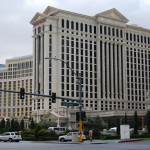Las Vegas (USA, Nevada)
Las Vegas – is a city in the US West, state of Nevada; it is the administrative center of Clark County, located in the central part of Mojave Desert, and it has the population of 552,200 citizens (as of 2006). Las Vegas is one of the biggest world entertainment and gaming centers. Numerous casinos, hotels, daily performances and shows attract tourists from all over the world.
The main casinos and hotels are located in the historical center of the city on Fremont Street in Downtown, as well as several miles down to the south on Las Vegas Boulevard – the central street of the city, crossing it from the north to the south, the busiest part of which being called the Las Vegas Strip (from Stratosphere Hotel in Las Vegas proper to the hotels in Paradise suburb), or simply the Strip.
Many major companies choose Las Vegas for their presentations and advertising campaigns. To a great extent it became the factor to form the service package of many hotels where it has become a norm; therefore, big projects of this nature can be easily realized in these hotels. On the territory of Las Vegas more than sixty grand casinos are concentrated with a countless number of gaming pavilions and exclusive hotels. The City of Sin, as Las Vegas is usually called, uses more electricity than the entire industry of France.
In 1829, a trade caravan, heading for Los Angeles, lost their way. Under the scorching sun exhausted people pitched their camp and several volunteers went out looking for a supply of water; among them was a Mexican Raphael Rivera who was lucky to find saving oasis in the desert sands.
The name of the city translates from Spanish as “meadows”. The city was founded on May 15, 1905. For a long time, the city served as the main stopover and supply base for railway trains. Nevada became famous as the State of freedoms and big opportunities. Quick weddings, thought to be immoral in the rest of the country, and fierce fights with monetary prizes for their winners took place here. The next loosening on gaming policy was made in 1915, when it was allowed to diversify the assortment of card games in casinos and to install slot machines. At first, the winners of slot machines would get their prizes in goods. The lucky ones would get cigars or alcohol instead of money. These changes, made in the law, laid a solid foundation for the future of the gaming business. The fortunes of Los Vegas drastically changed on May 19, 1931; on that day gambling was officially allowed on the territory of Nevada State. It is interesting to mention, that this project of increasing the state revenues was proposed by a respectable citizen of Nevada, Tobin, who never gambled in casinos himself. This money, he said, can be used for building many new schools. The liberal laws were inviting people to gamble (in USA all places, where people could gamble for money, were rapidly closing).
Pages: 1 2

